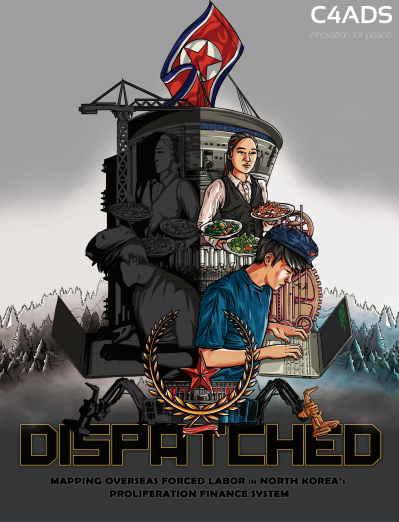By C4ADS
Executive Summary
North Korean overseas forced labour is both a proliferation finance and a human rights issue. The Kim regime sends citizens to work abroad under heavy surveillance, confiscates their wages, and uses the funds to support a nuclear program and domestic economy dependent on foreign currency. Previous research on the topic has relied heavily on anecdotal reporting and focused principally on either human rights abuses or workers in low-skilled occupations. Few reports have considered high-skilled labour in the context of North Korea’s labour export program, and while some investigations have connected individual labour operations to North Korea’s broader illicit portfolio, no previous studies have attempted to do so at scale across multiple industries and jurisdictions. This report extends our proven methodologies for tracking North Korea’s proliferation networks to the financial relationships of people and companies that facilitate its labour export program. In doing so, we leverage corporate registry documents, official labour statistics, tax filings, and trade records to demonstrate how DPRK overseas labour operations fit within North Korea’s broader proliferation finance system. This approach informs three key findings:
First, many companies and individuals that employ North Korean workers are linked to activities that violate United Nations Security Council Resolutions. For example, our analysis found companies that employ North Korean workers registered as active joint ventures and cooperative entities, provided banking services to DPRK nationals, and hired North Koreans to work on sensitive defense technologies including facial recognition software, insulated nanoceramics, and armor for military vehicles. North Koreans also work openly at local subsidiaries of companies sanctioned by both the United States and the United Nations for supporting North Korea’s missile program. Law enforcement can thus wield a wide range of legal instruments to drive action against commercial networks that exploit North Korean workers.
Second, firms that employ North Korean workers exhibit similar operational patterns across jurisdictions. In Russia, we map ultimate beneficial ownership and subsidiaries for all 691 people, companies, and organizations that the Russian Ministry of Labour approved to hire North Koreans between 2015 and 2018. Russian companies approved to hire North Korean workers exhibit decentralized corporate ownership structures but use common names and co-locate at a limited number of physical locations. We also identify 125 suspected North Korean restaurants around the world, more than two-thirds of which are in China. We find that, as in Russia, North Korean restaurants in China use common names and co-locate with other companies involved in an array of illicit commercial activities on behalf of the Kim regime. By examining labour operations at scale, this report offers robust empirical details about the modus operandi of firms that employ DPRK workers, which can empower law enforcement and civil regulators to enhance activities-based screening procedures for yet unidentified companies.
Third, despite trade restrictions, products of North Korean overseas labour—including advanced software and defense technology—continue to penetrate Western supply chains. North Korean forced labourers work overseas in sensitive industries that engage with research institutions, law enforcement bodies, and defense contractors in the United States and Europe. North Korea’s overseas workers have also used false identities
and local intermediaries to sell sophisticated software products through online freelance marketplaces. North Korea continues to access critical technologies through its high-skilled overseas workers, who reportedly work in the same draconian conditions as their counterparts in low-skilled occupations.
While the Countering America’s Adversaries Through Sanctions Act establishes mandatory sanctions on people and companies that employ North Korean workers, the Kim regime continues to dispatch citizens abroad to work in forced labour conditions. In doing so, it continues to flout international sanctions to generate foreign currency, acquire sensitive technologies, and access the international financial and trade systems. As this report demonstrates, open source network analysis can support law enforcement and civil regulators to locate North Korea’s overseas operations, identify networks of particularly high risk, and drive action against an ongoing proliferation finance stream predicated on the exploitation of workers.
Click here to read the interactive report online

